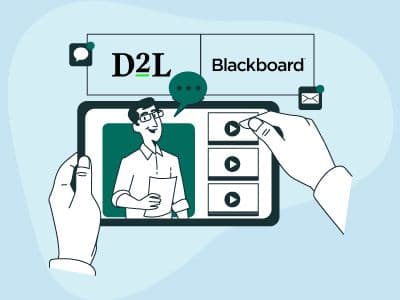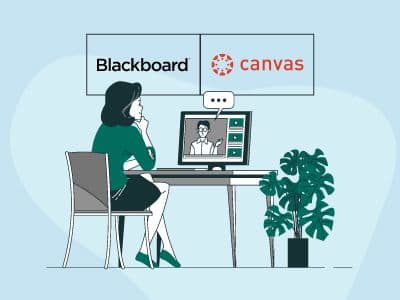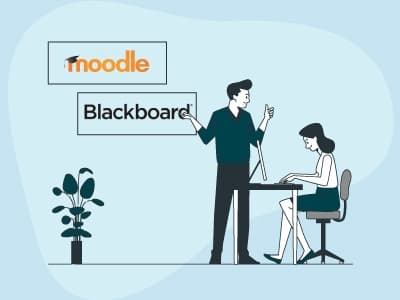Compare Features
Feature List | Blackboard Learn Software | TalentLMS |  LearnDash LMS | Absorb LMS | NEO LMS |
|---|---|---|---|---|---|
Activity Dashboard | |||||
Asynchronous Learning | |||||
Activity Tracking | |||||
Access Controls/Permissions | |||||
Applicant Tracking | |||||
Attendance Tracking | |||||
Collaboration Tools | |||||
Training Management | |||||
Certification & Licensing | |||||
Learner Portal |
Make decisions with real reviews from real users
Blackboard Learn is one of the most used LMS, especially in the educational field, due to its effective integration with educational software and the possibility to manage large institutions. However, when it comes to Blackboard, it may not perfectly suit every institution/ organization because of its cost, complexity, and features. Fortunately, some many more platforms and tools can be used in their stead, and these options are presented below.
Let’s briefly discuss the top 10 Blackboard Learn substitutes with unique features that could meet your requirements in the educational or corporate context.
Moodle
Moodle is another open source LMS with rich functionality, which is available for free and is preferred by many educational organizations who need a lot of possibilities and opportunities to individual the studying process of learners. Moodle has been developed through the community approach and thus guarantees it provides up-to-date solutions for the institution's needs.
Advantages: Moodle is available to use without cost and is exceptionally flexible and can be adapted depending upon the institution. Its active and vibrant community makes a lot of plugins freely available to help enhance the functionality of the software.
Best for: Schools and school systems and other institutions that have their own technical support personnel.
Comparison with Blackboard Learn
Blackboard includes basic help and many extras right from the box and is more expensive while Moodle is cheaper and offers countless opportunities, but it is not very user-friendly.
Canvas
There is a variety of reasons why Canvas is getting more popular: the simple aesthetics of the concept and easy navigation. It is an elastic LMS that is suited for both the academic institutions and the corporate world – the application supports a mobile app, enhancing the accessibility of Learning.
Advantages: Canvas is famous for the simplicity of its interface and the relatively latest patterns, which make course and users’ interfaces rather simple. It also works well with many other related tools, third-party included.
Best for: Administrators of schools, universities and those businesses that want a friendly and easy-to-use interface.
Comparison with Blackboard Learn
Both of them are used in educational institutions: Canvas has a more convenient and friendly interface compared to Blackboard as this one can be rather intricate and stuffed with functions.
Schoology LMS
Mainly a K-12 learning management system, Schoology is designed for educators, students, and school administrations. It has a focus on student learning and the environment it takes place in, providing resources for effective constructive collaboration.
Advantages: All of its enhancing features of collaborations make Schoology ideal for K-12 institutions. It also has a number of instructional app addons for boosting understanding in particular fields of education.
Best for: Schools interested in an easily navigated social learning environment.
Comparison with Blackboard Learn
Schoology used in K-12 tremendously, while Blackboard is used in higher education and corporate training, although Blackboard possesses features compared to Schoology.
TalentLMS
TalentLMS is a SCORM-compliant, web-based LMS designed for SMEs. It has an easy installation process as well as an interface which will enable the business to get into the solution and start running it without needing much time.
Advantages: TalentLMS is simple, affordable and can be applied to large businesses or organizations. It provides essential features of managing learning, albeit simpler than most systems will provide for learning management.
Best for: SMEs in search for an easy to use and inexpensive LMS solution.
Comparison with Blackboard Learn
TalentLMS has a simple and affordable pricing model which will suit a small business better than Blackboard, which has features that are better suited to larger institutions.
LearnDash
LearnDash is a WordPress plugin that enables websites to function as complete Learning Management Systems. It’s especially useful for content creators, education start-ups, and companies who work with WordPress for their business websites.
Advantages: There is nothing as customizable as LearnDash since it is integrated into the WordPress platform. It also comes with features such as drip-feed content, gamification and quizzes to make it a perfect tool for teachers.
Best for: Entrepreneurs, small businesses, and educational content creators using WordPress.
Comparison with Blackboard Learn
WordPress-based LearnDash may be better for those who are already using WordPress as a platform, as it has more freedom compared to Blackboard, which is an LMS platform focused on educational toolkits.
Absorb LMS
Absorb LMS is primarily a cloud-based platform which helps in offering vibrant learning experiences to the desired individuals. It is one of the most flexible and easily scalable tools, which is appropriate for use in small, medium, and even large enterprises.
Advantages: From this article about 80% of the features are appropriately recognized, namely Absorb LMS is recognized for its good reporting capability and a customizable feature with other systems, for instance, HR tools. It is intended for adaptation with the change in size of the organisation.
Best for: Mid-to-large organizations that need integration with other systems and who plan for wide utilization.
Comparison with Blackboard Learn
The main difference between Absorb LMS and Blackboard has to do with flexibility geared towards the corporate world and the seemingly broader features that cover student management oriented towards the academic environment.
Docebo
An LMS that is powered by AI and provides customized learning to the users is called Docebo. That characteristic differentiates it from most conventional learning management systems: it is automated and comes with built-in analytics.
Advantages: Docebo uses Artificial Intelligence to recommend courses that align with the learning preferences of the learner, and the company’s analytical features allow organizations to monitor and measure learning effectiveness.
Best for: Organisations that are large and have formalized learning management where automation and high analysis of data is possible.
Comparison with Blackboard Learn
While Blackboard is a more traditional LMS learning, Docebo’s integration of AI and automation makes it the better choice for businesses that prioritize individual learning.
Cornerstone LMS
Cornerstone LMS is one of the richest and complex systems, combining learning and talent management functionality which will be beneficial for large companies. Because of its extensive capability and strong features, it is recommended for organizations with workflow complexities.
Advantages: Cornerstone LMS has vast features falling under talent management, compliance training, and reporting. It is planned to accommodate progressive company size.
Best for: Companies that may have a number of employees to train or perhaps, need to manage their talents.
Comparison with Blackboard Learn
While working with Cornerstone the company is able to integrate deeper within the talent management software in comparison with Blackboard, which is more akin to learning management software.
Neo LMS
Neo LMS is relatively easy-to-navigate LMS that runs in the cloud and is aimed largely at schools and universities. It provides the given features combined with a simple interface, which will be suitable for educational purposes.
Advantages: Neo LMS is very easy to install and user friendly with lots of learning management tools created for school such as grading, tracking attendance and content development.
Best for: The institutions that are in the search of an easy-to-use and affordable Learning Management System.
Comparison with Blackboard Learn
Neo LMS provides the schools, colleges, and universities with cheaper solutions than Blackboard but does not offer all the extra options Blackboard includes.
Brainier LMS
Brainier LMS is designed for corporate environments, offering an adaptive learning platform that caters to businesses of all sizes. Its focus is on delivering customized learning paths for employees.
Advantages: Brainier LMS is flexible, scalable, and offers advanced reporting features, making it suitable for organizations that require tailored learning experiences.
Best for: Mid-to-large businesses that need adaptive learning solutions for employee training.
Comparison with Blackboard Learn
Brainier LMS offers more adaptability for corporate training, while Blackboard is primarily focused on educational institutions with structured learning paths.



